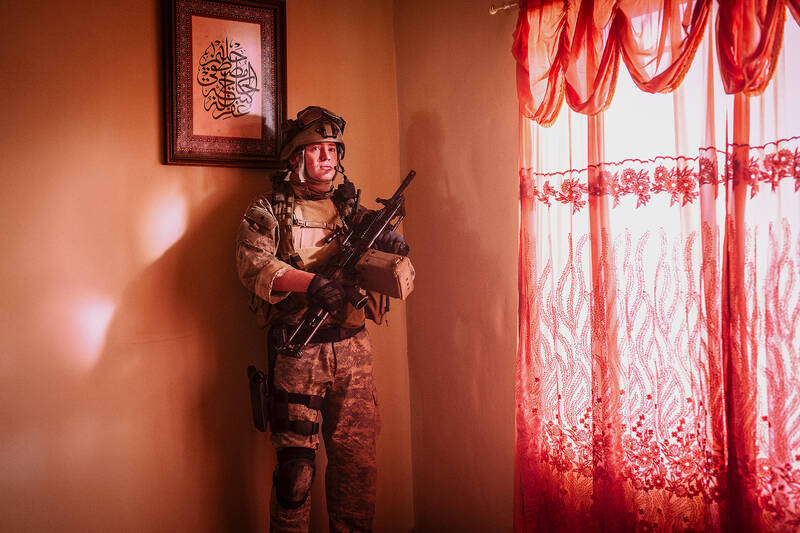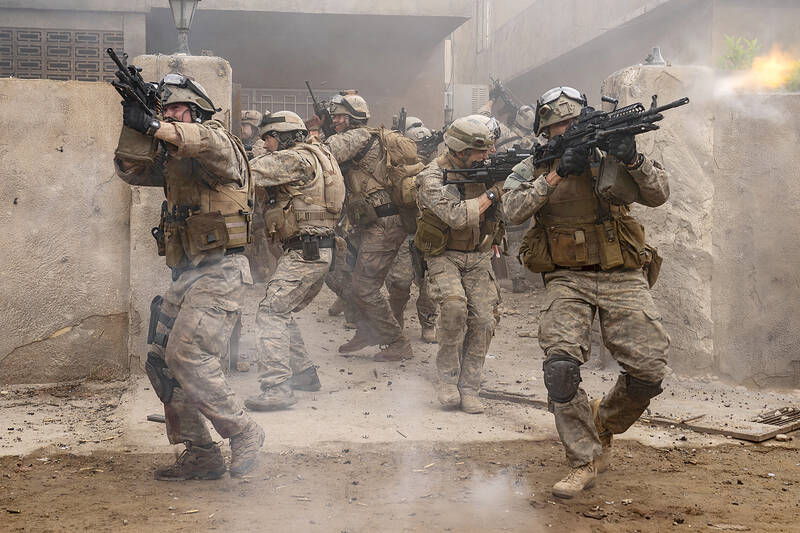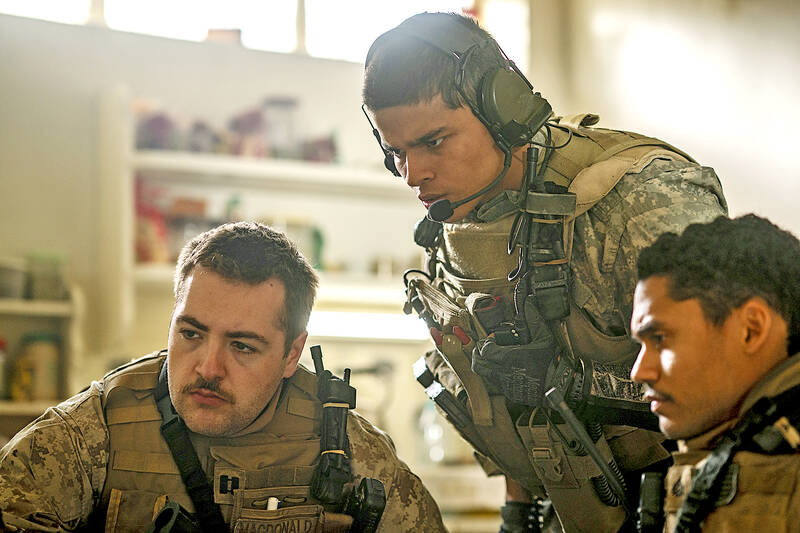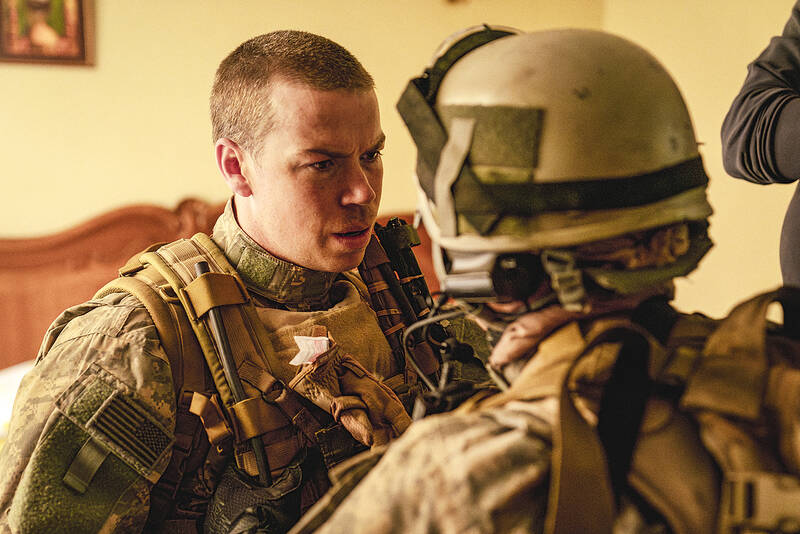Ray Mendoza and Alex Garland ’s Warfare is more defined by what it isn’t than what it is.
In their Iraq War-set film, there’s never any description of a wider strategy. There are no backstories to the American Navy SEALs whom we follow on an unspectacular mission. There’s not a short monologue about mom’s cooking back home, let alone a speculative word about life after the war. There’s not even a dramatic close-up to be had.
Warfare aspires to be, simply, just that. We are effectively embedded in a platoon on what seems to be a minor mission in Iraq in 2006. Walking in two single-file lines down a Ramadi street at night, one soldier says, “I like this house.” Under the cover of darkness, they rush inside the apartment building to set up their position while keeping the family inside quiet. In the morning, their sniper, laid out on a raised bed, sweats while looking out on an increasingly anxious scene. His rifle’s crosshairs drift through the street scenes outside, as suspected jihadists mobilize around them.

Photo: AP
War-movie cliches have been rigorously rooted out of Warfare, a terse and chillingly brutal immersion in a moment of the Iraq War. Clouds of IED smoke and cries of agony fill Garland and Mendoza’s film, with little but the faces of the SEALs to ground a nearly real-time, based-on-a-true-story dramatization. Few words are spoken outside the intense patter of official Navy jargon. When the mission comes to its bloody and hectic conclusion, the only utterance left hanging in the clouded air is the unanswered, blood-curdling shriek of a woman watching the men leave her bombed-out home: “Why?”
A year after Civil War, a movie predicated on bringing the horror of war home to American soil, Garland has returned with a film even more designed to implode fanciful and far-away ideas of war by bringing it acutely close. Mendoza, an Iraq War veteran who served as a consultant on Civil War, co-writes and co-directs Warfare from his own first-hand experience in Iraq. The movie is introduced as based on the memories of the troops involved, and Warfare gives little reason to quibble with its ultra verisimilitude.
That doesn’t mean Mendoza and Garland’s film isn’t without its sympathies. For a movie quaking with sonic tremors, the first thumps sounded in Warfare come from the 2004 music video to Eric Prydz’s Call on Me, as the battalion bops in harmony to the female bodies gyrating on a screen in front of them.

Photo: AP
In battle, they are hardly any less choreographed. If a mode of American war movie leans toward showing the follies of war on the ground, the soldiers of Warfare — while not immune to a little Call on Me imitation — are supremely precise. When things go haywire here, it’s not because the SEALs aren’t alert or are haphazard in their regard for the lives around them.
Among them are sniper Elliott (Cosmo Jarvis), Eric (Will Poulter), Tommy (Kit Connor), Sam (Joseph Quinn) and Ray (D’Pharaoh Woon-A-Tai). We never learn anything about any of them except their fidelity to their comrades and their willingness to do what’s necessary when even the heaviest fire is raining down on them.
Sounds of fire pop through the immersive sound design of Glenn Freemantle. Whether Warfare is the most accurate war film ever made or not, it’s certainly among the most sonically enveloping experiences of battle. After an explosion rocks the men, Warfare staggers in a concussed haze. The film’s craft, generally, is impressive, including production designer Mark Digby’s recreation of the Ramadi block.

Photo: AP
Despite all the effort to shed Warfare of war-movie tropes, though, they do intrude in one glaring way. Like countless movies before it, Warfare runs its credits alongside photographs of the real SEALs (some faces are blurred out), along with footage of them with the actors and filmmakers on set. To honor the real men is, of course, laudable and necessary. But the behind-the-scenes tone of the epilogue chafes with the spell cast by Warfare.
The point of Warfare, to me, seems less about paying these Navy SEALs tribute than showing combat how it truly unspools — messily, chaotically and pointlessly. With the exception of a pair of Iraqi interpreters, Warfare — despite its broad title — limits itself to one side of a battle. But I’d argue the only bad guy in “Warfare” isn’t on either side of the fight, but is found in the aerial viewpoint — used sporadically by the filmmakers — from a US plane overhead that renders every person mere pixels on a screen.
In this forensic portrait of war, the only way to not get what’s happening on the ground is to be too far from it. Francois Truffaut famously said there’s no such thing as an anti-war film because movies inherently glamorize war. Warfare, though, is intent on challenging that old adage.

Photo: AP

Under pressure, President William Lai (賴清德) has enacted his first cabinet reshuffle. Whether it will be enough to staunch the bleeding remains to be seen. Cabinet members in the Executive Yuan almost always end up as sacrificial lambs, especially those appointed early in a president’s term. When presidents are under pressure, the cabinet is reshuffled. This is not unique to any party or president; this is the custom. This is the case in many democracies, especially parliamentary ones. In Taiwan, constitutionally the president presides over the heads of the five branches of government, each of which is confusingly translated as “president”

Sept. 1 to Sept. 7 In 1899, Kozaburo Hirai became the first documented Japanese to wed a Taiwanese under colonial rule. The soldier was partly motivated by the government’s policy of assimilating the Taiwanese population through intermarriage. While his friends and family disapproved and even mocked him, the marriage endured. By 1930, when his story appeared in Tales of Virtuous Deeds in Taiwan, Hirai had settled in his wife’s rural Changhua hometown, farming the land and integrating into local society. Similarly, Aiko Fujii, who married into the prominent Wufeng Lin Family (霧峰林家) in 1927, quickly learned Hoklo (commonly known as Taiwanese) and

The low voter turnout for the referendum on Aug. 23 shows that many Taiwanese are apathetic about nuclear energy, but there are long-term energy stakes involved that the public needs to grasp Taiwan faces an energy trilemma: soaring AI-driven demand, pressure to cut carbon and reliance on fragile fuel imports. But the nuclear referendum on Aug. 23 showed how little this registered with voters, many of whom neither see the long game nor grasp the stakes. Volunteer referendum worker Vivian Chen (陳薇安) put it bluntly: “I’ve seen many people asking what they’re voting for when they arrive to vote. They cast their vote without even doing any research.” Imagine Taiwanese voters invited to a poker table. The bet looked simple — yes or no — yet most never showed. More than two-thirds of those

In the run-up to the referendum on re-opening Pingtung County’s Ma-anshan Nuclear Power Plant last month, the media inundated us with explainers. A favorite factoid of the international media, endlessly recycled, was that Taiwan has no energy reserves for a blockade, thus necessitating re-opening the nuclear plants. As presented by the Chinese-language CommonWealth Magazine, it runs: “According to the US Department of Commerce International Trade Administration, 97.73 percent of Taiwan’s energy is imported, and estimates are that Taiwan has only 11 days of reserves available in the event of a blockade.” This factoid is not an outright lie — that